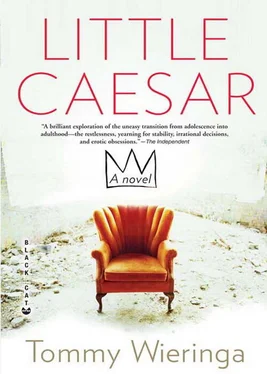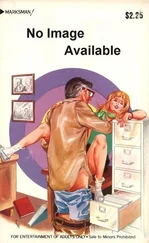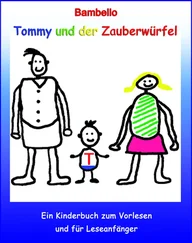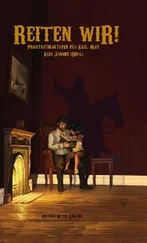One afternoon a man pauses at our table, he is pleasantly surprised to see her and bows with the grace of an Arab nobleman. He takes her hand and kisses it.
‘Miss LeSage,’ he says, ‘this is a very great honor.’
Behind his moustache, his teeth are splendid, between the two front ones is a little gap. All Trianon watches him as he disappears through the revolving doors.
‘He’s turned gray,’ my mother says.
I ask who he was, and why he called her that.
‘That was Omar Sharif, darling.’
It doesn’t occur to me to press on with my question, I am at the age when everything is both a miracle and implicitly accepted.
My father I remember only as a sound. He disappeared from my life before my active memory started; the auditory remembrance is all I have. It is a rhythmic, rasping sound that I can’t quite place. It is devoid of body or face and defies explanation. That rasping sound is all I can think of at school when they ask me who my father is.
I attend the Schutz American School, not far from tram station Raml and Trianon. There, one day, I again hear the sound that is my father. That rasping . The classroom door is open, the sound is coming from the hall. I freeze. The thought: he’s looking for me, he’s come to get me . . The sound comes to a halt at the door: after a knock, Mr. El-Fahd, the janitor, comes in. He speaks a few words to the teacher, then leaves the room. I ask if I may go to the toilet.
‘Next time you go at recess, Ludwig.’
I follow Mr. El-Fahd down the corridor, he found me, he was this close to me all the time! In the central hall I realize for the first time what is causing the sound, the whoosh whoosh whoosh of his trouser legs brushing together as he walks. Mr. El-Fahd asks me what I’m doing out of the classroom.
‘Do you have to fetch something?’
I shake my head.
‘Are you my father?’ I ask.
He laughs.
‘No, boy, you’ve got your own father. Now get back to the class, quick.’
He disappears into his cubicle beside the entrance and doesn’t turn to look at me again. Over my head hangs a nagging cloud of sorrow; for the rest of the day I live in the conviction that Mr. El-Fahd really is my father but that he’s lied to me for a Top Secret Reason — but slowly the cold light of logic penetrates into my misty fantasies and I understand that my father is not the only man in the world with knock-knees. The trousers of men with straight legs don’t make that sound. Not like that.
I float in the vacuum left by a father who isn’t there and a mother who is absent, whose sole pedagogical premise consists of laissez-faire, laissez-passer. Behind her eyes, dreams go floating by. Sometimes she’s so quiet, that mother of mine, you’d almost think she wasn’t there. I love her the way Mr. Cavour loves Mother Mary, about whom he tells us stories in an annex of the Alexandria Community Church. He convinces us of his boundless love for the mother of Jesus, even though he’s never met her. We see a movie about the Holy Family in the desert, and when it’s over Betsy Pearlman says, ‘I’m in love with Jesus.’
I sit on my bed, my mother is applying her makeup at the dressing table. I look at her reflection, my blood roaring from the scent of her mascara. The little brush rolls along her lashes, that intense gaze, there’s nothing else in the world she looks at in that same way.’
‘Do you want a little too?’ she asks.
She highlights my cheeks with rouge and paints my lips red. ‘Ludwig, so handsome, so handsome,’ she sings quietly. He doesn’t have to come back, that father of mine. I am a painted prince, I live with the queen in a palace with a fence around it and a guard in his little house beneath the eucalyptus trees along the street, we have no need of rasping trouser legs in this house. She paints my nails with polish, blows warm air on my fingertips, she’s so close and so physical now that I lean forward and fall against her — she loses her balance and grabs hold of the dressing table. She pushes me away.
‘Now look what you’ve done, it’s all ruined,’ she says.
A few minutes later, frowning angrily, she cleans her nails with acetone one by one and applies new polish. Her jewelry tinkles softly. She has lots of jewelry. Whenever she eats or drinks or applies nail polish you can hear her bracelets tinkle. The rings on her fingers make a tapping sound like a dog’s claws on a wooden floor.
‘Flap your hands now, then it will dry faster.’
But before long she drifts back into her absent-mindedness and becomes unreachable for me again. Her veiled look, a mirror clouded with age. A barrier hangs between her and things, one you run into like a sliding glass door that’s just been cleaned until there’s no more difference between inside and out. Behind that door she sits, I leave greasy fingerprints on the glass.
*
One day they left a huge wooden crate on the pavement, big as a house, and the next day another. That evening at dinner Eman didn’t say a word: she was grieving. Only a few days later did I see my mother again.
‘We’re going back, little prince,’ she said.
And when I asked where we were going, she replied, ‘To Europe.’
She was not going to wait for my father any longer, in a city where she didn’t belong. She had sold the house and ordered the crates. There had always been a powerful magnetic attraction between my mother and the world of objects — over the course of time the house had filled up with the ten thousand things. During the weeks that followed I watched as our life disappeared into the crates, everything we had, every chair, every cushion, every Bedouin carpet. When I saw how her temple was desecrated by the mover, I didn’t know whether to feel relief or sorrow.
The walls bore the pale shadows of vanished cupboards and rugs. When the workmen suddenly appeared in my room, it was Eman who bore the message that I was to pack my little red suitcase. I was to fill it with clothes and the things I absolutely could not do without; there was no knowing when the crates would be reunited with us.
We left Alexandria early in the morning. The taxi raced across the crumbly asphalt to Cairo, what I remember is the right side of the road.
‘We have to go back!’ I shouted suddenly. ‘I forgot something!’
But all we could do was go on, the road back was sealed. She didn’t ask what I had forgotten. I asked when we would be coming back.
‘I don’t know, Ludwig. For the time being, we’re going away.’
Then I understood the meaning of parting, I cried without making a sound. Another boy would come to live in my house, he would be drawn blindly to the spot where I had buried the forgotten treasure, a plastic box containing yellowed dog’s teeth I had found beneath the bushes, and crystals I had collected from the streets. Eman claimed they were pieces of car windows, but I knew better — crystals, from the depths of the earth. The dog’s teeth were full of scratches and grooves, and covered in a dark brown patina. Teeth and crystal, that was what was left of me. We were moving quickly away from my treasure, and there was nothing I could do.
Our first stop was Holland. Waiting for us at the airport were my mother’s sister and her husband: Aunt Edith and Uncle Gerard. They took us to the north of the country, a long trip by car; my mother and I sat in the back seat, the two people in the front didn’t say a word. My mother was wearing her sunglasses and seemed used to this silence.
‘The two of you would have been better off flying to Hamburg,’ my aunt said at one point. ‘Or to Bremen.’
‘No planes fly there from Egypt,’ my uncle said.
He spoke in a dialect unfamiliar to me. They lived in a rambling farmhouse beside a canal, not far from Bourtange, close to the German border. In Egypt I had seen the irrigation works maintained by farmers — canals, sluices, an increasingly intricate network of interlocking ditches, but never a canal like this one. Its straightness was intimidating.
Читать дальше












